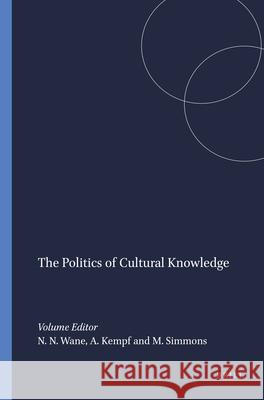The Politics of Cultural Knowledge » książka
The Politics of Cultural Knowledge
ISBN-13: 9789460914805 / Angielski / Twarda / 2011 / 178 str.
The Politics of Cultural Knowledge
ISBN-13: 9789460914805 / Angielski / Twarda / 2011 / 178 str.
(netto: 420,89 VAT: 5%)
Najniższa cena z 30 dni: 425,63
ok. 22 dni roboczych.
Darmowa dostawa!
The advent and implementation of European colonialism have disrupted innumerable epistemological geographies around the globe. Countless cultural ways of knowing and local educational practices have in some way been displaced and dislocated within the universalizing project of the Euro-Colonial Empire. This book revisits the colonial relations of culture and education, questions various embedded imperial procedures and extricates the strategic offerings of local ways of knowing which resisted colonial imposition. The contributors of this collection are concerned with the ways in which colonial education forms the governing edict for local peoples. In The Politics of Cultural Knowledge, the authors offer an alternative reading of conventional discussions of culture and what counts as knowledge concerning race, class, gender, sexuality, identity, and difference in the context of the Diaspora.In The Politics of Cultural Knowledge, Wane, Kempf and Simmons have put together a much-needed reader that could achieve the critical reconstructions for the timely re-voice-ing of anti-colonial and Indigenous knowledge systems that introspectively and deeply mediate the lives of people. It is a comprehensive, multi-locational, well-structured work that should represent an important milestone in harnessing the long-awaited inclusive epistemological platforms that must teach, empower and inspire those who seek different cultural ways of knowing. The Politics of Cultural Knowledge should immensely benefit students and researchers in the social sciences, education and those in cultural, and linguistic studies. Ali A. Abdi, PhD, Professor & Co-Director, Centre forGlobal Citizenship Education and Research (CGCER)Department of Educational Policy StudiesFaculty of Education, University of Alberta











